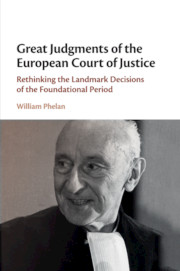 Great Judgments of the European Court of Justice
Great Judgments of the European Court of Justice Direct Effect of Directives
Published online by Cambridge University Press: 04 November 2020
This chapter discusses the Court’s 1974 judgment, Van Duyn, where the Court declared that provisions of Directives could enjoy direct effect in the national legal order. This judgment is often recognized as the landmark judgment on the ‘direct effect of Directives’, and remains a controversial decision. This chapter demonstrates that the direct effect of Directives was a logical consequence of the Court’s use of direct effect as a substitute for inter-state retaliation, and shows that this understanding of the direct effect of Directives can be found in the early writings of judge Lecourt.
To save this book to your Kindle, first ensure no-reply@cambridge.org is added to your Approved Personal Document E-mail List under your Personal Document Settings on the Manage Your Content and Devices page of your Amazon account. Then enter the ‘name’ part of your Kindle email address below. Find out more about saving to your Kindle.
Note you can select to save to either the @free.kindle.com or @kindle.com variations. ‘@free.kindle.com’ emails are free but can only be saved to your device when it is connected to wi-fi. ‘@kindle.com’ emails can be delivered even when you are not connected to wi-fi, but note that service fees apply.
Find out more about the Kindle Personal Document Service.
To save content items to your account, please confirm that you agree to abide by our usage policies. If this is the first time you use this feature, you will be asked to authorise Cambridge Core to connect with your account. Find out more about saving content to Dropbox.
To save content items to your account, please confirm that you agree to abide by our usage policies. If this is the first time you use this feature, you will be asked to authorise Cambridge Core to connect with your account. Find out more about saving content to Google Drive.